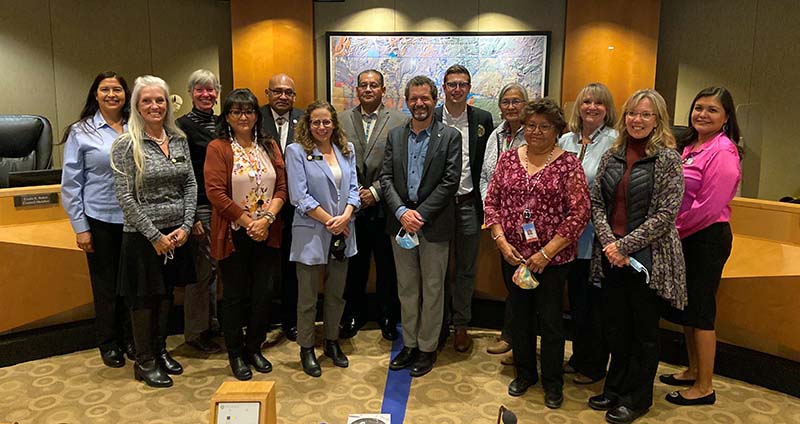CU in southwest Colorado
University of Colorado President Todd Saliman and five members of the Board of Regents last week traveled to southwest Colorado for an outreach trip to identify additional partnership opportunities in the region.
The two-day visit included meetings in Durango and Ignacio with school district leaders, members of the Southern Ute Indian Tribe, the business community, local journalists and Fort Lewis College leaders, as well as CU Boulder postdoctoral students teaching at the college.
“We’re committed to living up to our name and being Colorado’s university, which means serving all parts of Colorado,” Saliman said. “This trip, like the ones we’ve taken to other regions of the state, isn’t ‘one and done.’ It’s the first step toward identifying specific actions we can take to serve the people of Colorado in the best way possible. We want to be a consistent presence in and resource for southwest Colorado and all corners of the state.”
The visit kicked off Oct. 26 with a meeting with journalists from the Durango Herald to discuss issues facing CU and higher education in Colorado. CU leaders then went on to meet with representatives from the Ignacio and Durango school districts to talk about the value of a four-year degree and how to help high school students envision themselves as future college students, so that they apply to a college or university and ultimately thrive.
“The conversation with the Ignacio School District was both illuminating and productive,” said Regent and Board Chair Jack Kroll, who was joined by fellow regents Callie Rennison, Sue Sharkey, Lesley Smith and Ilana Spiegel. “These outreach trips are incredibly valuable as they offer us the opportunity to hear directly from our stakeholders. That face-to-face engagement enables CU to be a better partner and help catalyze positive change.”
Ignacio School District Superintendent Chris deKay expressed gratitude for CU’s visit. “We really appreciate the outreach from CU to rural communities and would embrace a partnership moving forward to ensure more representation of rural students on CU’s campuses.”
The CU delegation also met with leaders of the Southern Ute Indian Tribe. With tribal members on each of CU’s campuses, the meeting highlighted successes as well as opportunities to strengthen the university’s partnership with the tribe and other Indigenous communities. La Titia Taylor, education director for the Southern Ute Indian Tribe, expressed her commitment to working with CU in the region.
“I am encouraged and excited about revitalizing our relationship with President Saliman and the university,” she said. “This relationship will be built through agreements that will provide educational opportunities and meet the needs of our people and tribal government. As a Southern Ute, I am so grateful I can be part of this partnership.”
Day two of the tour included a meeting with Durango business leaders to identify ways CU can meet the region’s workforce needs. The trip concluded with a tour of Fort Lewis College (FLC), where CU leaders met with President Tom Stritikus and other college administrators, as well as a handful of CU Fellows. CU Boulder’s College of Arts and Sciences and FLC established the CU@FLC Postdoctoral Teaching Fellowship in 2020, which enables CU postdoctoral students to serve as visiting professors at FLC. With several other partnerships between the institutions, CU and FLC leaders discussed opportunities for additional collaboration in the future.
“What is unique about CU@FLC is the way in which the strengths of each institution are leveraged to the benefit of the other,” said Theresa Hernandez, associate dean for research and a professor at CU Boulder. Hernandez, who has extensive experience working in southwest Colorado, was part of last week’s CU delegation. “CU’s recent Ph.D. recipients from various disciplines across Arts and Sciences benefit from FLC’s strengths in experiential learning and mentored teaching, using small class sizes within which each student learns and develops. In this way, the research and scholarship done in the laboratory, the field or the archives comes alive and has a real impact on students.”
CU’s delegation also included Assistant Vice President of Engagement Tony Salazar; Vice President for Communications Michael Sandler; and Senior Associate Vice President of State Relations Heather Retzko.
The visit to southwest Colorado was one of several planned engagement trips to give CU leaders opportunities to hear directly from Coloradans and help advance state priorities around higher education and workforce needs. This fall’s tour included visits to Fort Morgan, Sterling and Pueblo in September and October; a trip to the Western Slope is slated for later this month.


